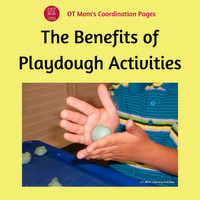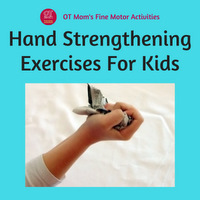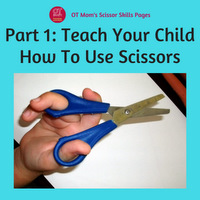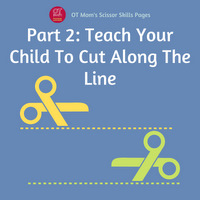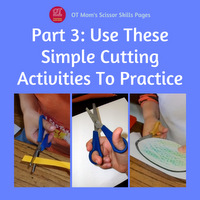- Home Page
- Fine Motor Activities
- Why Some Fine Motor Activities Are Not Really Helpful
Fine Motor Skills Activities...
Why Some Don't Really Help
Why do some fine motor skills activities frustrate your child?
Not all activities that are supposed to improve your child's skills actually do so. Why else is your child reduced to tears and frustration when trying them?
Many websites and educational toys will tell you that their activities will improve your child’s fine motor skills.
But perhaps you have found that your child struggles to do the activity, and gives up in frustration – and their fine motor skills remain poor.
I have written this article to help you to understand what is happening, and to help you to choose the best fine motor skills activities that will really help your child.
Analyzing Fine Motor Activities
I have found that you can basically classify fine motor skills activities into two groups:
- Those that USE or NEED fine motor skills.
In other words, you need to already have decent fine motor skills in order to do them properly. If your fine motor skills are poor, you will just get frustrated. - Those that DEVELOP fine motor skills.
These activities work on the underlying "foundations" that a child needs in order to see an improvement in fine motor skills. I call these foundations the "Essential Bases". Even kids with poor fine motor skills can take part in these activities because they are designed to develop their skills.
Activities That USE Fine Motor Skills
Does the activity REQUIRE the child to have decent fine motor skills to start with?
These activities are the ones that USE fine motor skills.
Coloring in, pencil-and-paper work, building model airplanes, some construction toys, craft work, and threading beads are some of them.
 Most construction toys require kids to have good fine motor skills already
Most construction toys require kids to have good fine motor skills alreadyIf your child already has fairly decent fine motor skills, then
- they are able to do these activities
- they enjoy them as they get a great end product
- they finish them in the allotted time (ie they don't work too slowly)
HOWEVER, if your child has poor fine motor skills,
- they may get tired easily and give up;
- or their clumsy fingers may keep messing up and they give up;
- or their parent/teacher gets frustrated with their messy work, and they give up.
And because your child gives up, their fingers don’t get the practice they need.
Of course, a really determined or bright child may find a method of doing it, but it usually involves doing the activity in a way that does not use the small muscles of the hands efficiently.
For example, look at the distorted grip that this child uses to hold the paint brush!
I have also seen children wedging a construction toy between the knees to screw it on, or using their mouth to hold the wire for threading beads.
They may be able to complete the activity with a great deal of effort, but their fine motor skills are not necessarily improved.
 Poor fine motor skills can affect how well a child takes part in an activity
Poor fine motor skills can affect how well a child takes part in an activityActivities That DEVELOP Fine Motor Skills
If you want to improve your child's fine motor skills, then look for activities that specifically aim to strengthen hand and finger muscles, and that work on improving dexterity.
You also need to consider whether the activity is working on what I call one of the Four Essential Foundations (or bases) of fine motor development
 Some activities help to DEVELOP your child's fine motor skills
Some activities help to DEVELOP your child's fine motor skillsThe Four Essential Bases For Fine Motor Skills
Developing good fine motor skills requires that your child develops skills in what I call the Four Essential Bases, or Foundations.
These foundations are:
- Postural Control (core muscles and shoulder muscles)
- Tactile Perception (touch perception)
- Hand Function (hand and finger muscles; this includes scissor cutting skills)
- Bilateral Coordination
If your child's fine motor skills are poor, and if your child gets frustrated with regular fine motor tasks, then request an occupational therapy evaluation to figure out which "foundation" is weak.
Your occupational therapist will then help you find activities that will help your child develop a stronger foundation for fine motor skills.
So, whenever you want to do some fine motor skills activities with your child, ask yourself: "Which essential foundation is this activity working on?"
If it is an activity merely for the sake of keeping busy, demanding skills that your child does not have, then you will both be frustrated.
But if the activity is developing an Essential Foundation, then your child has a better chance of succeeding and enjoying the task.
Fine Motor Skills Activities That Can Help Your Child
Almost all of the fine motor skills activities on my site are aimed at trying to improve your child's fine motor skills, without making the assumption that their skills are good to start with!
Check out these pages for a range of free activity ideas that can help your child master fine motor skills with a whole lot less frustration!
All Of My Fine Motor Activities In One Place!
Do you want practical activities to help develop your child's fine motor skills with everyday resources?
Are you tired of lists of suggestions that don't show you HOW to do the activities?
My Fine Motor Activities E-Book contains lots of helpful information as well as more than 24 pages of photographed activities to help support your child's fine motor skills!
There are multiple activities on each page, making this a treasure trove for parents, teachers and therapists!
I hope you were helped by this article.
Why not sign up for my free, occasional newsletter to stay in touch with new pages on my site?
- Home Page
- Fine Motor Activities
- Why Some Fine Motor Activities Are Not Really Helpful
Share this page to help others!
Didn't find what you were looking for? Try a search of my site!


